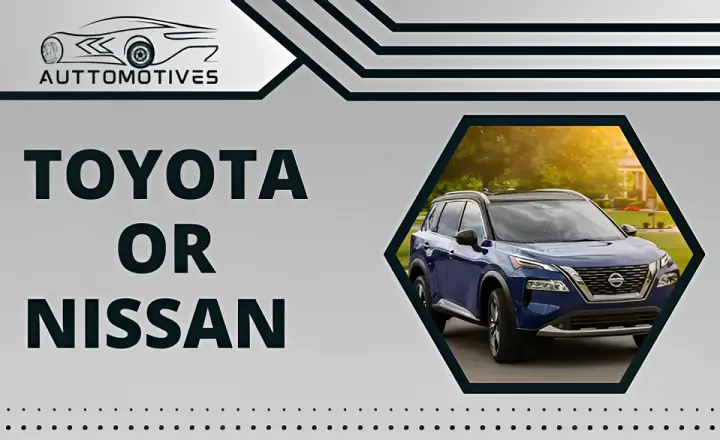Toyota or Nissan | Learn Which is Better For You
When buying a new car, one of the most significant decisions you’ll need to make is choosing between different brands. Two of the most famous Japanese automakers are Toyota and Nissan, both known for their reliability, affordability, and fuel efficiency. While both brands have their strengths and weaknesses, determining which is better for you ultimately depends on your preferences and needs.
In this article, we’ll compare Toyota and Nissan across various categories, such as safety, performance, interior, technology offerings, pricing, and more. By the end of this article, you’ll be equipped with all the information you need to decide whether a Toyota or Nissan is the right choice for your lifestyle.
Overview of Toyota:

Toyota is one of the leading car manufacturers in the world, known for producing high-quality vehicles that have significantly impacted the automotive industry. The company was established by Kiichiro Toyoda in 1937 and has since become one of the most prosperous automobile manufacturers globally. The brand’s success can be attributed to its unwavering commitment to providing customers with reliable, long-lasting cars.
One of Toyota’s hallmark traits is its ability to produce vehicles with exceptional build quality. This level of craftsmanship has been evident in popular models like Corolla and Camry, which have become household names due to their reliability and durability. Furthermore, Toyota has maintained its reputation for excellence with the Land Cruiser SUV and Hilux pick-up truck, known for its robustness and off-road capabilities.
In 2008, Toyota was the largest automaker in the world, with a reputation for producing dependable and fuel-efficient vehicles. The company’s flagship model, the Prius hybrid, had become a hit, with consumers increasingly concerned about rising gasoline prices and environmental issues. Toyota’s success was built on a philosophy of continuous improvement known as “kaizen,” which emphasized efficiency and quality at every production level.
By 2012, Toyota faced new challenges in a rapidly evolving industry. While its traditional internal combustion engine (ICE) vehicles remained popular with consumers, the company recognized that it needed to adapt to changing market trends. This led to a renewed focus on hybrid technology and other alternative fuels. As a result, Toyota emerged as the undisputed leader in the hybrid vehicle segment.
Overview of Nissan:

Nissan Motor Co. is a Japanese multinational automobile manufacturer founded in 1933. It has its headquarters in Yokohama and is the second-largest automaker in Japan, right after Toyota. The company’s vehicles are sold under the Nissan, Infiniti, and Datsun brands, and it competes with other major car manufacturers like Honda, Toyota, and General Motors.
Nissan’s success can be attributed to its focus on providing fuel-efficient cars to its customers. The company has been investing heavily in electric vehicle technology for several years now and released its first fully electric vehicle, called the LEAF EV back in 2010. While Tesla overtook Nissan as the world’s largest seller of electric vehicles by volume a few years ago, Nissan remains one of the leading players in this space.
Which brand is more affordable?
When purchasing a car, affordability is one of the most critical factors every buyer must consider. Choosing the right brand can be challenging with a wide range of automakers in the market. With Toyota’s more comprehensive selection, prices, and value proposition, it is undoubtedly an economical brand that can compare.
Toyota has consistently been at the forefront of producing high-quality vehicles with competitive pricing. The company’s reputation for reliability and durability means buyers can feel confident about investing in a Toyota vehicle without breaking the bank. Toyota offers many models, from compact cars to SUVs, to suit different needs and budgets. You can also watch Netflix on Toyota.
One aspect distinguishing Toyota from other brands regarding affordability is its commitment to fuel efficiency. Many of their models have exceptional gas mileage ratings, reducing long-term expenses for drivers as they save on fill-ups at the pump.
Toyota or Nissan: Tabular Differences
| Specification | Nissan | Toyota |
| Hatchbacks | Versa Note, LEAF | Yaris Hatchback, Corolla Hatchback, Prius |
| Hybrid | Versa, Sentra, Altima, Maxima | Yaris, Corolla, Camry, Avalon, Mirai |
| Combo | Kicks, Rogue, Rogue Sport, Murano, Pathfinder, Ariya | C-HR, RAV4, Highlander, Venza |
| Pickup truck | Armada | 4Runner, Land Cruiser, Sequoia |
| Roadster | 370Z, GT-R | GR 86, Supra |
| Electric Vehicles | LEAF, Ariya | Mirai FCEV |
| Trucks | Frontier, Titan | Tacoma, Tundra |
When it comes to choosing between Toyota and Nissan, it can be a tough decision for many car buyers. Both automakers have carved a strong reputation for themselves in the automobile industry. Some key differences set them apart.
One of the main differences is in terms of their target audience. While Toyota focuses on practicality and reliability, Nissan has built its brand image around performance and innovation. This is reflected in their product lineups – Toyota produces cars known for longevity and fuel efficiency, such as the Camry and Corolla. At the same time, Nissan offers vehicles like the GT-R and 370Z, which prioritize speed and handling.
Another difference lies in their approach to technology. Toyota has been at the forefront of hybrid technology, with its Prius model leading the way, while Nissan has invested heavily in electric vehicle technology with cars like the Leaf.
Conclusions
Choosing between Toyota and Nissan ultimately depends on your individual needs and preferences. While both brands offer reliable vehicles with impressive technology and safety features, they have unique strengths and weaknesses. Consider budget, fuel efficiency, size, and desired features when deciding. Whether you choose Toyota or Nissan, research and test drive multiple models before making a final decision. You can find the perfect car to fit your lifestyle with careful consideration and evaluation.
FAQs
Is Nissan as reliable as Honda or Toyota?
There is no one-size-fits-all answer to this question, as the reliability of different automakers depends on various factors, including their history and track record. Some feel that Nissan is more reliable than Honda or Toyota.
What is more reliable than Toyota?
This question has no definitive answer, as different people have different opinions. Some people may prefer Toyota because of their quality and reliability, while others may prefer Daihatsu because of its more affordable prices.
Why is Toyota better than others?
Toyota is better than others for a few reasons. They have a long history of quality and customer service, they offer a wide variety of vehicles, and their prices are always reasonable.
Why is Toyota the most preferred brand?
Toyota is better than others for a few reasons. They have a long history of quality and customer service, they offer a wide variety of vehicles, and their prices are always reasonable.







